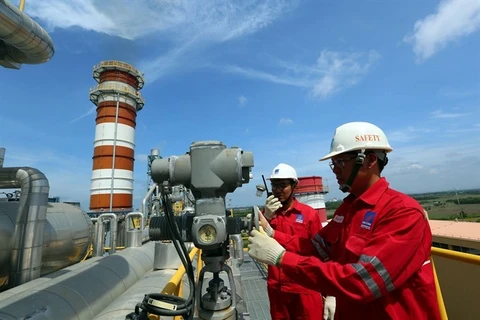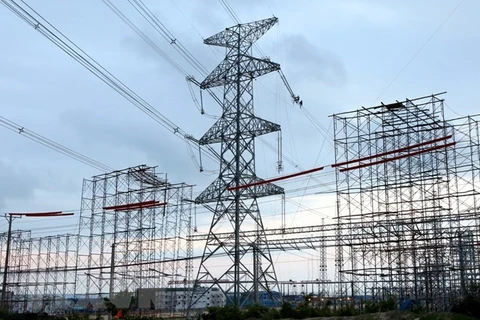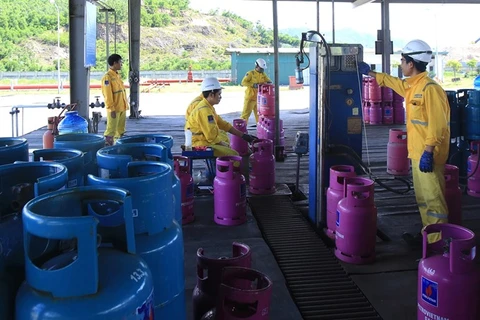Hanoi (VNS/VNA) - Vietnam could face power shortages in the early 2020s, heard a workshop in Hanoi on November 29.
Tran Viet Anh, head of Strategic Division under the Electricity of Vietnam (EVN) told the workshop entitled ‘Developing Sustainable Energy and Protecting Environment in Vietnam’ that the shortages are likely to happen from 2020 to 2025.
To meet surging demand for power, the country needs 60,000MW of electricity by 2020; 96,500MW of electricity by 2025 and 129,500MW of electricity by 2030. This means total installed capacity would have to increase by 6,000-7,000MW of electricity per year.
Anh said the total installed capacity of the electricity sector is currently 47,750MW. Thus, he said, raising the capacity to 129,500MW in just 12 years was a big challenge given the slow progress of many power plants.
He said only seven coal-fired power plants with total capacity of 7,860MW were currently under construction. More than 18,000 of 26,000MW of coal thermal power projects are expected to be operational in the next five years, however, construction has not yet started.
Regarding oil and gas, Vu Truong Son, Director General of the Vietnam National Oil and Gas Group (PetroVietnam), said Vietnam would need 10 million tonnes of liquefied natural gas (LNG) by 2020. Therefore, besides exploiting existing oilfields, it was necessary to consider building infrastructure for importing LNG.
A representative from the Vietnam National Coal and Mineral Industries Group (Vinacomin) said it was able to supply only between 42-45 million tonnes of coal per year while the domestic coal demand rose suddenly over the past eight years (from 20 million tonnes in 2009 to 40 million tonnes in 2017). Most of them were for electricity production.
To meet the need for more coal, the corporation has sought to imports.
The amount of coal imported climbed rapidly to more than 14.67 million tonnes last year from three million tonnes in 2014.
It was estimated the amount of coal needed for production of electricity would reach 60 million tonnes by 2020 and 86 million tonnes by 2025. So far this year, the amount of coal providing for thermal plants was 26.9 million tonnes. That figure would rise to 31.9 million in 2019.
The corporation has been suffering difficulties in coal exploitation due to outdated technology and a shortage of funds for infrastructure development, the representative said.
The increase in tax for coal including environment fee and fee for licensing also posed a challenge, he said.
Speaking at the workshop, Tran Viet Ngai, Chairman of the Vietnam Energy Association, said it was necessary to review electricity producing projects to ensure energy security. Obstacles to those projects should be resolved to speed up their progress.
He proposed that a detail strategy be set forth to deal with coal shortage, ensuring that thermal power plants have enough material for normal operation.
Ngai also suggested that special treatment such as loan guarantee be offered to investors so that power projects could be soon built and operated. These projects could not bring high profit so it was difficult to attract foreign investment, he said. — VNS/VNA
Tran Viet Anh, head of Strategic Division under the Electricity of Vietnam (EVN) told the workshop entitled ‘Developing Sustainable Energy and Protecting Environment in Vietnam’ that the shortages are likely to happen from 2020 to 2025.
To meet surging demand for power, the country needs 60,000MW of electricity by 2020; 96,500MW of electricity by 2025 and 129,500MW of electricity by 2030. This means total installed capacity would have to increase by 6,000-7,000MW of electricity per year.
Anh said the total installed capacity of the electricity sector is currently 47,750MW. Thus, he said, raising the capacity to 129,500MW in just 12 years was a big challenge given the slow progress of many power plants.
He said only seven coal-fired power plants with total capacity of 7,860MW were currently under construction. More than 18,000 of 26,000MW of coal thermal power projects are expected to be operational in the next five years, however, construction has not yet started.
Regarding oil and gas, Vu Truong Son, Director General of the Vietnam National Oil and Gas Group (PetroVietnam), said Vietnam would need 10 million tonnes of liquefied natural gas (LNG) by 2020. Therefore, besides exploiting existing oilfields, it was necessary to consider building infrastructure for importing LNG.
A representative from the Vietnam National Coal and Mineral Industries Group (Vinacomin) said it was able to supply only between 42-45 million tonnes of coal per year while the domestic coal demand rose suddenly over the past eight years (from 20 million tonnes in 2009 to 40 million tonnes in 2017). Most of them were for electricity production.
To meet the need for more coal, the corporation has sought to imports.
The amount of coal imported climbed rapidly to more than 14.67 million tonnes last year from three million tonnes in 2014.
It was estimated the amount of coal needed for production of electricity would reach 60 million tonnes by 2020 and 86 million tonnes by 2025. So far this year, the amount of coal providing for thermal plants was 26.9 million tonnes. That figure would rise to 31.9 million in 2019.
The corporation has been suffering difficulties in coal exploitation due to outdated technology and a shortage of funds for infrastructure development, the representative said.
The increase in tax for coal including environment fee and fee for licensing also posed a challenge, he said.
Speaking at the workshop, Tran Viet Ngai, Chairman of the Vietnam Energy Association, said it was necessary to review electricity producing projects to ensure energy security. Obstacles to those projects should be resolved to speed up their progress.
He proposed that a detail strategy be set forth to deal with coal shortage, ensuring that thermal power plants have enough material for normal operation.
Ngai also suggested that special treatment such as loan guarantee be offered to investors so that power projects could be soon built and operated. These projects could not bring high profit so it was difficult to attract foreign investment, he said. — VNS/VNA
source
























